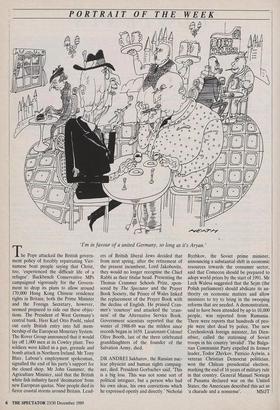PORTRAIT OF THE WEEK
`I'm in favour of a united Germany, so long as it's Aryan.' The Pope attacked the British govern- ment policy of forcibly repatriating Viet- namese boat people saying that Christ, too, 'experienced the difficult life of a refugee'. Backbench Conservative MPs campaigned vigorously for the Govern- ment to drop its plans to allow around 170,000 Hong Kong Chinese residence rights in Britain; both the Prime Minister and the Foreign Secretary, however, seemed prepared to ride out these objec- tions. The President of West Germany's central bank, Herr Karl Otto Poehl, ruled out early British entry into full mem- bership of the European Monetary System. The Rover Group announced that it would lay off 1,000 men at its Cowley plant. Two soldiers were killed in a gun, grenade and bomb attack in Northern Ireland. Mr Tony Blair, Labour's employment spokesman, signalled the end of his party's support for the closed shop. Mr John Gummer, the Agriculture Minister, said that the British white fish industry faced `decimation' from new European quotas. Nine people died in fierce coastal storms around Britain. Lead- ers of British liberal Jews decided that from next spring, after the retirement of the present incumbent, Lord Jakobovits, they would no longer recognise the Chief Rabbi as their titular head. Presenting the Thomas Crammer Schools Prize, spon- sored by The Spectator and the Prayer Book Society, the Prince of Wales linked the replacement of the Prayer Book with the decline of English. He praised Cran- mer's 'courtesy' and attacked the 'crass- ness' of the Alternative Service Book. Government scientists reported that the winter of 1988-89 was the mildest since records began in 1659. Lieutenant-Colonel Olive Booth, last of the three celebrated granddaughters of the founder of the Salvation Army, died.
DR ANDREI Sakharov, the Russian nuc- lear physicist and human rights campaig- ner, died. President Gorbachev said, 'This is a big loss. This was not some sort of political intriguer, but a person who had his own ideas, his own convictions which he expressed openly and directly.' Nicholai Ryzhkov, the Soviet prime minister, announcing a substantial shift in economic resources towards the consumer sector, said that Comecon should be prepared to adopt world prices by the start of 1991. Mr Lech Walesa suggested that the Sejm (the Polish parliament) should abdicate its au- thority on economic matters and allow ministers to try to bring in the sweeping reforms that are needed. A demonstration, said to have been attended by up to 10,000 people, was reported from Rumania. There were reports that hundreds of peo- ple were shot dead by police. The new Czechoslovak foreign minister, Jiri Dien- stbier, called the stationing of Soviet troops in his country 'invalid'. The Bulga- rian Communist Party expelled its former leader, Todor Zhivkov. Patricio Aylwin, a veteran Christian Democrat politician, won the Chilean presidential election, marking the end of 16 years of military rule in that country. General Manuel Noriega of Panama declared war on the United States; the Americans described this act as `a charade and a nonsense'. MStJT










































































































 Previous page
Previous page